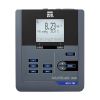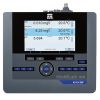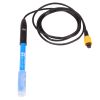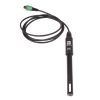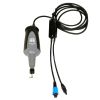YSI MultiLab 4010-2W Dual Channel Benchtop Meter
Features
- Two channel input for pH, ORP, DO/BOD, or conductivity
- 500 data set storage in manual mode; 10,000 data sets in automatic logging mode
- Large, easy to read color display
- Free ground shipping
- Expedited repair and warranty service
- Lifetime technical support
- More
Overview
The YSI MultiLab 4010-3W is ideal as a pH meter, ORP meter, conductivity meter or BOD meter as a stand-alone or combination meter for parameters in the laboratory.
Benefits
- Two channel input for pH, ORP, DO/BOD, or conductivity
- Use non-IDS (other manufacturer's) pH or ORP sensors with a simple adapter for DIN or BNC
- Data storage - 500 data sets in manual mode and 10,000 data sets in automatic logging mode
- Large, easy-to-read graphic color displays
- Intelligent, digital sensors - plug and play sensors
- GLP traceability (sensors store serial # and calibration data)
- Antibacterial keypad
- USB connectivity to manage data
- 3-year warranty
IDS Intelligent Digital Sensors
The IDS sensors automatically store their unique serial number and calibration data. In addition, they also digitally process the measurement signal. The sensors can be moved from instrument to instrument and maintain their calibration data and transmit this information to the new instrument.
- Plug and play connectivity with each instrument
- IDS senors store their own unique ID with serial number and calibration data
- Digital sensor recognition, processing and data transfer
- Includes self-stirring BOD, pH, ORP and conductivity sensors
- BOD probe uses optical dissolved oxygen technology and includes a guarded sensor tip
Parameters: pH, ORP (mV), DO %, DO mg/L (BOD probe), Partial pressure, Conductivity, Resistivity, Salinity, TDS, Temperature
Measurement Channels: 2
Data Storage: 500 data sets in manual mode and 10,000 data sets in automatic mode
Interface/PC Connectivity: Mini USB; USB-A
Display: Color, Graphic
Keypad: Antibacterial
Power Supply: Universal power supply
Temperature Compensation: Yes; except ORP
Calibration Points: DO and Conductivity = 1; pH = 1 to 5
Calibration Storage: 10 maximun
Calibration Timer: 1 to 999 days
GLP Compliant: Yes
Certifications: CE, cETLus
Warranty: 3 years
- (1) Benchtop meter
- (1) Electrode stand
- (1) Universal power supply
- (1) Manual
- (1) Software CD
- (1) USB cable
In The News
Three Decades of Research at Acton Lake
A multi-disciplinary team at Miami University, Ohio, has been studying the environmental change at Acton Lake for over three decades. Using three different NexSens buoys over this time, the team has an incredible archive of data that is helping build a picture of Acton’s past, present, and future. Until recently, a NexSens CB-50 buoy was used alongside other environmental monitoring at Acton Lake. In May 2025, the Miami team deployed a new XB-200 buoy , future-proofing their ongoing monitoring using real-time buoy systems. Acton Lake, a small hypereutrophic reservoir in southwest Ohio, covers 2.4km² and has a maximum depth of about 8m. The dam was built in 1956, and the lake has a large agricultural watershed.
Read MoreSource Water Monitoring in Albany, New York: Tracing Water Quality throughout Tributaries
Thousands of US cities pull their drinking water from natural source waters like reservoirs, rivers, and streams, making overall watershed health a key consideration for water providers. In Albany, New York, the Albany Department of Water and Water Supply delivers drinking water to over 100,000 residents as well as monitors and manages the larger drinking water supply watershed. Hannah Doherty, Environmental Specialist at the Albany Department of Water and Water Supply , spends her days working with a small team to monitor the drinking supply and the connected water bodies. Doherty explains, “We’re the first to encounter the water that ends up being the drinking water.
Read MoreWildfire Prevention in the Sierra Nevada Region with the Yuba Watershed Institute
Though recent wildfires have sparked new conversations about wildfire management and response, groups like the Yuba Watershed Institute have been monitoring the forests and water resources of the Sierra Nevada region for decades, managing approximately 5,000 acres of land with the Bureau of Land Management (BLM) and about 7,000 acres in private land partnerships. The goal of the Institute is to work with local communities and land agencies to improve watershed and forestry management through informed practices and public outreach. The goals of the Yuba Watershed Institute are three-fold: Improve the ability of fire suppression agencies like the California Department of Forestry and Fire Protection ( CAL FIRE ) and the US Forest Service.
Read More




































